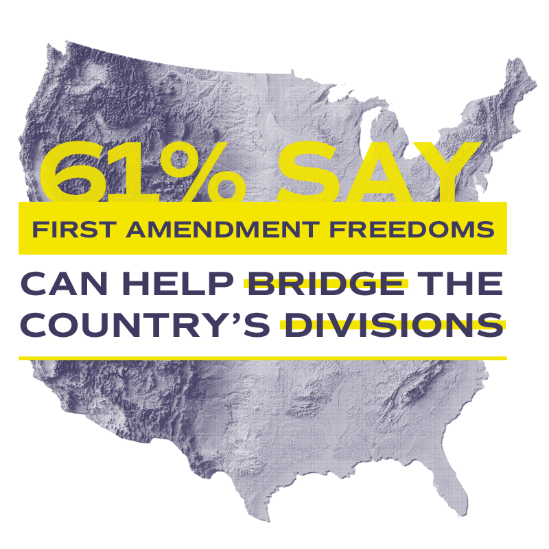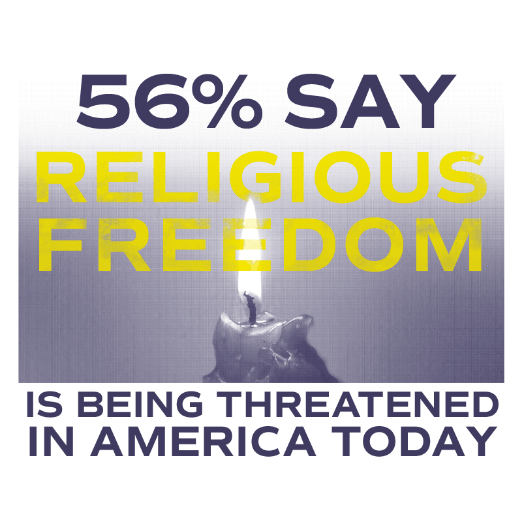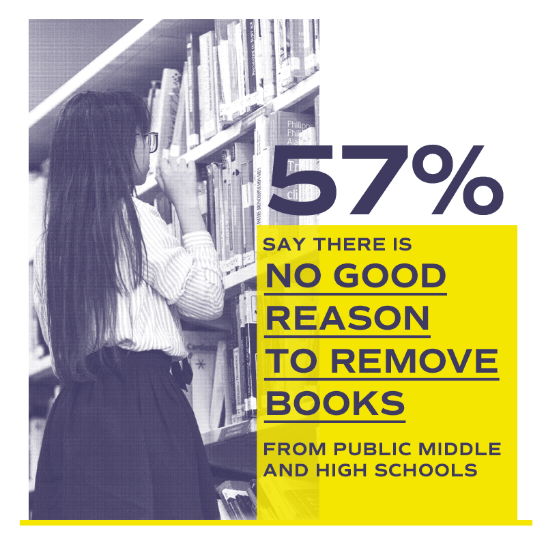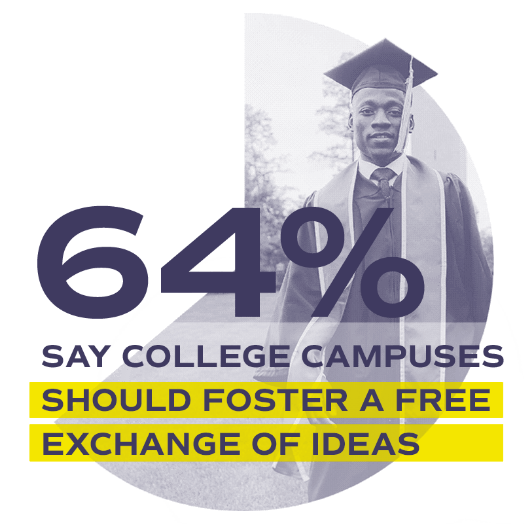2022 Update
First Amendment Sparks — And Could Bridge — Divides
Americans strongly value the First Amendment, but there’s more uncertainty and tension when it comes to how these freedoms are exercised in today’s world. That’s what the Freedom Forum found in the 2022 update to its survey “The First Amendment: Where America Stands.” This survey expands upon polls about Americans’ knowledge and understanding of the First Amendment conducted by the Freedom Forum since 1997.
 In a March 2022 survey of more than 800 respondents, consistently high percentages (93%) say the First Amendment is vital, and that it doesn’t go too far in the rights it guarantees (69%).
In a March 2022 survey of more than 800 respondents, consistently high percentages (93%) say the First Amendment is vital, and that it doesn’t go too far in the rights it guarantees (69%).
Three-quarters say that it should never change, compared to 68% in 2020 (with 64% expressing this position strongly, up from 54% in 2020).
In 2020, half of respondents said their hope in America was fading, but 75% were optimistic Americans could work together despite political differences. This year, in response to a new question, 61% said the First Amendment can help us bridge those divisions.
But while the order in which people value the five freedoms is unchanged (speech, religion, petition, press then assembly), overall awareness is down slightly for nearly all freedoms.
And few – just over one quarter – know that the First Amendment does not apply to private employers, for example. While a majority (56%) know the First Amendment protects hate speech, just a third say it should.
Gender Divides
Men are more likely than women to hold a more absolutist view of the First Amendment and to value its more challenging or difficult aspects, such as protecting the free exchange of criticism, potentially offensive ideas and hate speech. Compared to women, men felt more strongly that:
- If it were up to them, they’d ratify the First Amendment today (71% compared to 53% of women), and it should never be changed (73% compared to 57% of women, with women more likely than men to be unsure).
- Campuses should foster free exchanges of ideas, even if offensive (72% compared to 56%), and shouldn’t limit controversial speakers (61% compared to 52%).
- Hate speech should be protected (38% compared to 26%).
- People should be able to criticize officials by name at meetings (84% vs 69%).
Demographic Differences
Black and white respondents were most likely (63% of each) to feel the First Amendment can help us bridge divisions. So were respondents in the South (66%). Black and Hispanic respondents were more likely than white or Asian respondents to say the First Amendment goes too far, while white respondents were most likely to say that the First Amendment should never be changed (72% compared to fewer than 60% among Black, Hispanic and Asian American/Pacific Islander respondents).
Among age groups, just 9% of Boomers said it goes too far in the rights it protects, compared to 19% of Gen Y. Gen Z was the least certain, with 13% saying it goes too far but 31% unsure. Respondents in the Midwest (68%) and South (67%) were also most likely to say the First Amendment should never be changed, compared to 55% in the Northeast.
Religion
 Americans’ divisions over the role of religion in the public square are deepening.
Americans’ divisions over the role of religion in the public square are deepening.
More than half (56%) say that religious freedom is being threatened in America today. A quarter disagreed and one fifth were not sure. Almost as many (45%) say that Christian beliefs are more under attack than other religious and nonreligious traditions. Nearly a third incorrectly said that the Constitution specifies the United States is a Christian nation.
Without prompting, 39% of Americans could name freedom of religion as a First Amendment right, while 67% could identify it from a list – down slightly from awareness in 2020.
White respondents were much more likely than Black or Hispanic, and somewhat more likely than Asian respondents, to value religion most among the five freedoms.
Views of Religion by Age, Race and Region
Black respondents were most likely to say religious freedom is being threatened (60%), followed by white respondents (59%). Black respondents were also most likely (50%) to say that Christian beliefs are particularly threatened. Respondents in the South were most likely (61%) to see religious freedom as threatened, particularly Christianity (53%).
The younger the respondent, the less likely they are to say religious freedom is threatened. This could be correlated with the increasing visibility of diverse religions or the rising number of people who are unaffiliated with any religion – known as “nones” – particularly among younger Americans.
Respondents remain divided over whether business owners should be required to serve customers when the customers’ requests conflict with the owners’ beliefs: 33% say they should be compelled to do so; 37% say they should not. Women were less likely to say owners should be able to deny services that violate their beliefs, and more likely to be uncertain.
Speech
Slightly more Americans (37%) identified speech as the most essential First Amendment freedom compared to 2020, with fewer naming all rights as equally important. Men were more likely than women to identify speech as the most essential freedom – and to embrace controversial speech.
False Claims
Nearly two thirds say the First Amendment does not protect false claims of politicians. In fact, it does.
Hate Speech
When asked if the First Amendment protects hate speech, a majority (56%) of Americans correctly said that it does, which is about the same as the percentage who answered this correctly in 2020. Less than a third (32%) agreed that it should, including 38% of men and 26% of women. When asked if hate speech should be protected, the most likely to agree were Hispanic (36%), Black (35%), white (31%) then Asian (24%) respondents. Nearly 60% of Black, 49% of Asian and 42% of Hispanic respondents say it’s more important to prevent hate speech than protect free speech, compared to 29% of white respondents.
Speech in Schools
Americans overall know that students retain some First Amendment rights at school and want open exchanges on campuses, even if controversial.
When it comes to the issue of access to books in public schools, a majority (57%) say “there is no appropriate reason to ban books” from being taught in classes or available in the library at middle and high school levels. Of those who say removing books may be OK sometimes:
- 28% say it’s OK to limit books that contain sexual content.
- 24% say removing books with violent content is OK.
- 16% would be OK removing books discussing sexual orientation.
- 21% say it’s OK to limit books discussing race in a way that may be offensive.


Black, Hispanic and Asian respondents were more likely than white respondents to be OK with limiting books that discuss race in potentially offensive ways.
More Americans today than in 2020 know that students cannot be forced to recite the Pledge of Allegiance, and nearly three-quarters know that school dress codes are permitted by the First Amendment.
Most Americans know that public school administrators can’t limit protest at school solely because they disagree with the students’ cause (65%). While 82% know that college students can protest speakers with whom they disagree, 56% say public colleges should not limit the types of speakers or speech allowed on campus, with men again more likely to agree than women. On college campuses, 64% overall, including 72% of men and 56% of women, say it’s important to foster a free exchange of ideas, even if offensive to some.
Social Media
Americans are also concerned but uncertain about free speech on social media.
Almost half say social media platforms violate the First Amendment when they block people, but 51% correctly say they do not. The First Amendment prohibits government from inhibiting free speech, but social media firms are private companies and can set their own rules for users. But close to 60% say social media platforms should be required to treat viewpoints equally. Similar numbers say that government should be able to hold social media companies responsible for false or misleading content posted by users – with nearly a quarter unsure. Respondents in the South (61%) and Midwest (60%) were most likely to say social sites should treat viewpoints equally, compared to those in the Northeast and West.
Press
Americans support the watchdog role of the press in general but are concerned about how they see this being executed, the survey shows.
Today, 63% say it’s important for the press to be a watchdog on government, up from 58% in 2020.
But just 37% say the press does a good job with this role, compared to 37% who say it doesn’t and 25% who are unsure. Displeasure with the performance of news sources may correlate with doubt about which are good sources of news:
- Close to a third say – incorrectly – that government can regulate content on cable news.
- 40% place more trust in local news outlets than in national media, while 42% aren’t sure which to trust more.
- 31% trust information on current events from their friends more than from news reports, compared to 34% and 35% who don’t or who aren’t sure.
- Half (51%) say social media is not a good source of news.
Similarly, Americans value some legal protections for the news media but in other ways would want more restrictions on the news media.
A majority, 61%, say journalists deserve special legal protection from harm – noteworthy given the increase in physical attacks on journalists in recent years.
However, 53% would support a special licensing process for journalists, like that for doctors and lawyers – perhaps not recognizing press freedom is a right for all and that licensing would limit this freedom. Fewer (31%) would support requiring journalists to disclose their political affiliation, with nearly 30% unsure about licensing and disclosure.
Echoing recent calls by prominent political leaders and two Supreme Court justices to reexamine the legal protections for news media from public figures who claim libel, 34% say the media should not be protected from being sued when making, through an honest mistake, a false statement. Thirty-eight percent would retain protections in line with the current legal standard.
Demographically, Asian respondents were most likely to value the role of and protections for the press. So were respondents in the Midwest, where people were also most likely to value local outlets in particular. Men were more likely than women to say the media should be a watchdog (72% compared to 55%) and less likely to support a licensing process (49% compared to 56%).
Few respondents overall considered freedom of the press to be the most essential First Amendment right, but respondents in the Northeast (8%) and Midwest (7%) were most likely to name the press as most important. People in the Northeast were also most likely to want special legal protections for journalists from physical harm or threats (68%) but expressed more skepticism about other protections.
Assembly and Petition
Like the First Amendment overall, Americans value the freedoms of assembly and petition in theory while in practice, participation skills are getting rusty.
A strong majority (79%) say assembly is necessary to a healthy democracy, particularly men (84%) compared to women (74%). People should be able to criticize public officials by name at meetings, say 76% of respondents.
Only 39% could identify petition as a First Amendment freedom, compared to 45% in 2020.
And it’s been longer since people have participated in most assembly and petition-related activities: Fewer have protested, shared political opinions, signed a petition, contacted an official, volunteered, commented on a news story or spoken at a public meeting in the three months before being surveyed.
People are also concerned about the impact of protest, to the extent that they would limit it – potentially drastically.
When asked if protest organizers should be held accountable for violence by anyone present during a demonstration, even if they didn’t have a direct connection to the person who caused the violence or the act, 43% said yes. Asian (61%) and Hispanic respondents (51%) were most likely to say demonstration organizers should be accountable for violent behavior compared to 40% of white and 42% of Black respondents.
This level of accountability could severely limit the ability of activists to organize, in effect curtailing the right to assemble – as it already has in some states and examples.
Methodology
This research was conducted online using Decision Analyst’s American Consumer Opinion® panel and trusted partner panels. Data collection was conducted from March 8-13, 2022. A 10-minute questionnaire was completed by 803 qualified respondents aged 16 and over living in the U.S. The study’s margin of error is 3.44% at a 95% confidence level. Results are rounded to nearest whole number.